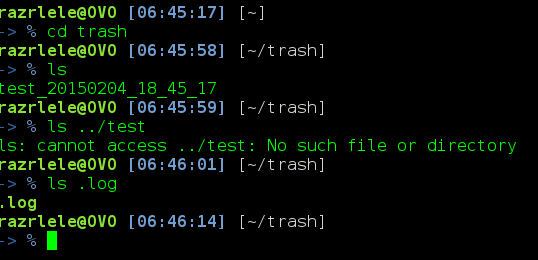回收站linux实现
2015-08-20 22:44
573 查看
#Save as /bin/delete
#!/bin/bash
realrm="/bin/rm"
if [ ! -d ~/trash ]
then
mkdir -v ~/trash
chmod 777 ~/trash
fi
if [ $# -eq 0 ]
then
echo "Usage: delete file1 [file2 file3....]"
echo "If the options contain -f, then the script will exec 'rm' directly"
fi
while getopts "dfiPRrvw" opt
do
case $opt in
f)
exec $realrm "$@"
;;
*)
# do nothing
;;
esac
done
echo -ne "Are you sure you want to move the files to the trash?[Y/N]:\a"
read reply
if [ $reply = "y" -o $reply = "Y" ]
then #####
for file in $@
do
if [ -f "$file" -o -d "$file" ]
then
if [ -f "$file" ] && [ `ls -l $file|awk ' {print $5}'` -gt 2147483648 ]
then
echo "$file size is larger than 2G, will be deleted directly"
`rm -rf $file`
elif [ -d "$file" ] && [ `du -sb $file|awk '{print $1}'` -gt 2147483648]
then
echo "The directory:$file is larger than 2G, will be deleted directly"
`rm -rf $file`
fi
fi
done
fi
now=`date +%Y%m%d_%H_%M_%S`
filename="${file##*/}"
newfilename="${file##*/}_${now}"
mark1="."
mark2="/"
if [ "$file" = ${file/$mark2} ]
then
fullpath="$(pwd)/$file"
elif [ "$file" != ${file/$mark1} ]
then
fullpath="$(pwd)${file/$mark1}"
else
fullpath="$file"
fi
echo "the full path of this file is : $fullpath"
if mv -f $file ~/trash/$newfilename
then
$(/bin/logTrashDir "$newfilename $filename $now $fullpath")
echo "files: $file is deleted"
else
echo "the operation is failed"
fi#Save as /bin/logTrashDir #!/bin/bash if [ ! -f ~/trash/.log ] then touch ~/trash/.log chmod 700 ~/trash/.log fi echo $1 $2 $3 $4>> /home/razrlele/trash/.log
#Save as /bin/restoreTrash
#!/bin/bash
originalPath=$(awk /$filename/'{print $4}' "$HOME/trash/.log")
filenameNow=$(awk /$filename/'{print $1}' "$HOME/trash/.log")
filenamebefore=$(awk /$filename/'{print $2}' "$HOME/trash/.log")
echo "you are about to restore $filenameNow,original name is $filenamebefore"
echo "original path is $originalPath"
echo "Are you sure to do that?[Y/N]"
read reply
if [ $reply = "y" ] || [ $reply = "Y" ]
then
$(mv -b "$HOME/trash/$filenameNow" $originalPath)
$(sed -i /$filenameNow/'d' "$HOME/trash/.log")
else
echo "no files restored"
fi#Save as /bin/cleanTrashCan
#!/bin/bash
arrayA=($(find ~/trash/* -mtime +7 | awk '{print $1}'))
for file in ${arrayA[@]}
do
$(rm -rf "${file}")
filename="${file##*/}"
echo $filename
$(sed -i /$filename/'d' "$HOME/trash/.log")
done赋予脚本执行权限
chmod +x delete restoreTrash logTrashDir cleanTrashCan
delete脚本执行过程

回收站目录

生成.log记录

restoreTrash 脚本执行过程

最后再用systemd/Timers定期每星期日下午六点执行cleanTrashCan脚本 首先编辑
/etc/systemd/system/cleanTrash.service
[Unit] Description=Clean Trash Can [Service] Type=simple ExecStart=/bin/cleanTrashCan
再编辑
/etc/systemd/system/cleanTrash.timer
[Unit] Description=Runs cleanTrashCan every week [Timer] OnCalendar=Sun, 18:00 Unit=cleanTrash.service [Install] WantedBy=multi-user.target
执行
systemctl start cleanTrash.timer systemctl enable cleanTrash.timer
相关文章推荐
- 全面解析Linux数字文件权限
- Linux Vim 基本操作
- CentOS系统下的Hadoop集群(第6期)_WordCount运行详解
- linux内核学习---1. linux逻辑地址到物理地址的过程
- Linux 文件搜索命令
- Linux命令 - 压缩命令 zip
- linux 命令 - 帮助命令 help info
- linux总结应用之三 安装和配置串行,并行链路
- Linux find 命令
- 手工释放linux内存――/proc/sys/vm/drop_cache
- [Linux]工作中常见的命令
- Centos7下Amarok播放mp3
- Linux定时任务crontab
- linux信号处理
- Sublime Text编辑远程Linux服务器上的文件
- linux 系统 tar 的用法详解
- RHEL6.4使用光盘镜像做本地源安装gcc
- 转 Linux调优方案,sysctl.conf的设置
- Linux eject弹出光驱
- wps for linux 不能使用中文输入法
